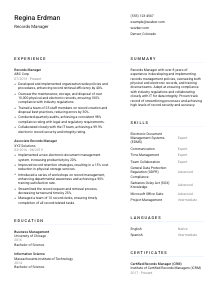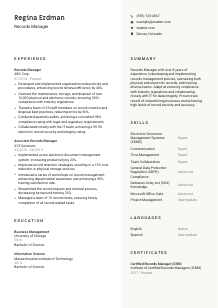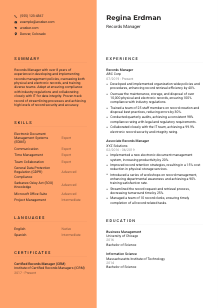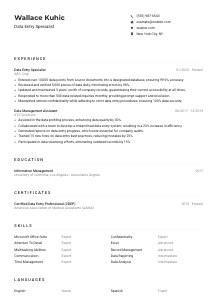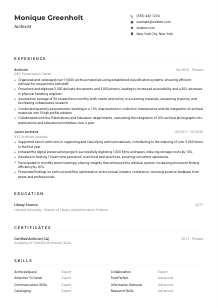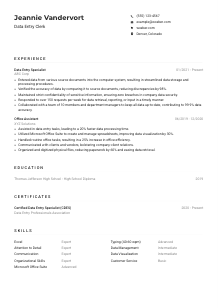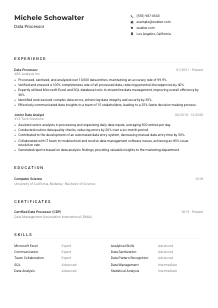Records Manager Resume Example
Documenting files, but your resume remains in the archives? Dive into this Records Manager resume example, alphabetized using Wozber free resume builder. Learn how to index your organizational finesse with job demands, putting your career on the "Must Keep" shelf!
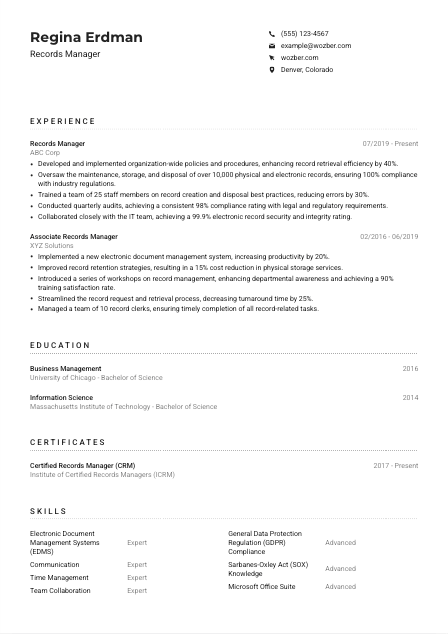
How to write a Records Manager resume?
Welcome, aspiring Records Manager! In the realm of records management, your resume is the key that unlocks the door to your dream job. But crafting a resume that resonates with hiring managers demands more than just listing your experience - it requires a strategic approach tailored to the Records Manager role.
Armed with Wozber's free resume builder, including its ATS-friendly resume templates and ATS resume scanner, we're here to guide you through creating a resume that not only meets the job requirements but also stands out in the Applicant Tracking System (ATS). Let's embark on this journey together to ensure your resume places you at the top of the 'Must Interview' list.
Personal Details
The Personal Details section is your first handshake with potential employers. In the context of a Records Manager position, it's crucial to make this introduction speak volumes. Let's fine-tune this section to reflect the precision and attention to detail you're renowned for in your field.
1. Spotlight Your Name and Title
Ensure your name is boldly presented. Right under your name, align with the job by titling yourself as 'Records Manager.' This directly tells hiring managers – 'This is the role I'm crafted for.'
2. Precision in Contact Information
Your phone number and professional email address should follow next. Each digit and letter must be double-checked for accuracy, mirroring the meticulous nature of a Records Manager.
3. Location as a Plus
Mentioning 'Denver, Colorado' not only meets the geographical requirement but signals to employers your readiness and eliminates any potential hurdles related to relocation.
4. Professional Online Presence
If applicable, include a link to your LinkedIn profile or a personal website showcasing your professional projects. This can provide a deeper insight into your capabilities and achievements.
5. Steer Clear of Excess
Stick to the essentials. Details such as age or marital status are not just unnecessary but also distract from your professional qualifications.
Takeaway
Consider your Personal Details section as your professional greeting: concise, precise, and strategically structured. This is your first impression; make it count by showcasing your professionalism and alignment with the role right from the start.





Experience
The Experience section is where you shine a spotlight on your professional journey, strategically aligning it with the Records Manager role. Let's craft this segment to highlight your expertise in managing both physical and electronic records, your ability to navigate regulations, and your knack for team collaboration.
- Developed and implemented organization‑wide policies and procedures, enhancing record retrieval efficiency by 40%.
- Oversaw the maintenance, storage, and disposal of over 10,000 physical and electronic records, ensuring 100% compliance with industry regulations.
- Trained a team of 25 staff members on record creation and disposal best practices, reducing errors by 30%.
- Conducted quarterly audits, achieving a consistent 98% compliance rating with legal and regulatory requirements.
- Collaborated closely with the IT team, achieving a 99.9% electronic record security and integrity rating.
- Implemented a new electronic document management system, increasing productivity by 20%.
- Improved record retention strategies, resulting in a 15% cost reduction in physical storage services.
- Introduced a series of workshops on record management, enhancing departmental awareness and achieving a 90% training satisfaction rate.
- Streamlined the record request and retrieval process, decreasing turnaround time by 25%.
- Managed a team of 10 record clerks, ensuring timely completion of all record‑related tasks.
1. Dissect the Job Posting
Identify key responsibilities from the job description, such as 'Develop and implement organization-wide records management policies' and 'Conduct regular audits.' These tasks need to be reflected in your experience.
2. Chronological Clarity
Start with your most recent position. Clearly list your roles, companies you've worked for, and the duration of your employment. Each entry is a building block of your professional narrative.
3. Showcase Achievements with Precision
For each role, provide concise bullet points that illustrate your specific contributions, such as 'Enhanced record retrieval efficiency by 40% through the development and implementation of policies.' This demonstrates your direct impact.
4. Quantifiable Success
Whenever possible, back your achievements with numbers. Did you reduce error rates, increase compliance, or save costs? Concrete figures bring your successes to life.
5. Relevance is Key
Ensure every point underscores your expertise in records management. Extraneous details dilute the potency of your resume; keep the focus tight and targeted.
Takeaway
Your Experience section should be a testament to your prowess in records management, reflecting both the depth and breadth of your expertise. It's more than a list; it's the narrative of your professional journey crafted to showcase why you're the ideal candidate for the Records Manager position.
Education
For a Records Manager, education lays the groundwork for your expertise. While it may seem straightforward, presenting this section with a strategic lens can significantly bolster your resume. Let's ensure your educational background aligns seamlessly with your career aspirations.
1. Highlight Required Degrees
Begin by showcasing degrees that directly align with the job requirements. A 'Bachelor of Science in Business Management' and a 'Bachelor of Science in Information Science,' for instance, underline your foundational knowledge in key areas relevant to records management.
2. Structure for Easy Reading
Present your education in a clear format: Name of Degree, Field of Study, University, and Graduation Date. This straightforward approach allows hiring managers to quickly verify your qualifications.
3. Degree Specifics Matter
Ensure your degree details precisely match the job's educational requirements. This not only demonstrates you have the requisite background but also that you pay attention to details – a crucial trait for a Records Manager.
4. Courses and Projects
If relevant, highlight particular courses or projects that showcase skills specific to records management or regulatory compliance. This adds depth to your educational credentials.
5. Additional Achievements
Mentions of honors, scholarships, or associations related to your field can further distinguish your educational background, especially for early-career professionals.
Takeaway
Your education is more than a list of degrees; it's proof of your commitment and base of knowledge in the field of records management. Position it as a robust foundation that supports your expertise and prepares you for the complexities of the role.
Certificates
Certificates are the badges of continual learning and expertise in your field. For a Records Manager, they underscore your dedication to staying abreast of industry standards and regulations. Let's pinpoint how to leverage this section to reflect your commitment to excellence.
1. Relevance to Job Requirements
While the job description might not specify needed certifications, including relevant ones like 'Certified Records Manager (CRM)' showcases your specialized knowledge and ongoing commitment to professional development.
2. Prioritize Pertinence
Focus on certifications that are directly related to records management, compliance, or the technologies used in the field. This strategic selection tells hiring managers you're not just experienced – you're current.
3. Validity Dates Matter
For certifications with expiration dates or those recently acquired, include the dates. This information communicates the currency of your expertise.
4. Keep Current
The world of records management is continually evolving, as are the regulations governing it. Make a commitment to regular updates and the pursuit of new certifications, remaining on the cutting edge of the field.
Takeaway
Certifications are a powerful tool in demonstrating your dedication to professional growth and expertise in records management. They serve as tangible proof of your skills and set you apart from other candidates. Continuously seek out opportunities to learn and certify your skills.
Skills
The Skills section is your strategic showcase, a quick glance at your professional toolbox tailored to the Records Manager role. In this segment, let's list those hard and soft skills that paint you as the ideal candidate, reflecting a mix of technical proficiency and interpersonal finesd—hallmarks of an outstanding Records Manager.
1. Match Job Description
Extract skills directly from the job posting, such as 'Proficiency in electronic document management systems (EDMS)' and 'Strong knowledge of industry regulations.' Aligning your skills list with these requirements demonstrates that you're prepared to hit the ground running.
2. Highlight Pertinent Skills
Include both hard skills like 'General Data Protection Regulation (GDPR) Compliance' and soft skills such as 'Excellent communication and interpersonal skills.' A balanced skills section reflects your versatility.
3. Format for Clarity
Present your skills in neat, accessible lists. This clarity ensures that hiring managers—and ATS systems—can quickly identify your strengths.
Takeaway
Your Skills section is a concise compilation of your competencies that directly align with the Records Manager role. It's your chance to affirm to hiring managers that you possess the specific skill set needed to excel in the position.
Languages
In today's globalized world, language skills can enhance your value as a Records Manager, especially in multinational corporations or roles that require communication with international stakeholders. Let's navigate how to effectively display your linguistic proficiency.
1. Determine Relevance
While the job posting emphasizes comfort with English, additional languages you speak fluently could set you apart—demonstrating a capability for international communication and understanding.
2. Prioritize According to Job Needs
List English first, as specified in the job requirements, followed by other languages you speak and your proficiency level, reinforcing your ability to meet and exceed the basic communication needs of the role.
3. Include Additional Languages
Beyond the specified need for English, mentioning languages like Spanish, if fluent, can be an asset, showcasing your ability to engage with a broader clientele or team members.
4. Honesty in Proficiency Levels
Clearly detail your proficiency levels (Native, Fluent, Intermediate, Basic) for transparency. It's important that your self-assessment matches your actual capabilities.
5. Contextualize Your Skills
For roles with an emphasis on communication or international dealings, highlight how your language skills have previously benefitted projects or teams. This practical application showcases the real-world value of your linguistic abilities.
Takeaway
Language skills can significantly enhance your resume, offering a testament to your communication abilities and potential for broader engagement within and beyond the organization. Treat these skills as complementary to your professional profile – bridges to new opportunities.
Summary
The Summary section is your elevator pitch - an opportunity to make hiring managers sit up and take notice. Here, you'll encapsulate your professional identity as a Records Manager, highlighting key achievements and traits that align with the job description.
1. Capture the Job Essence
Begin by understanding the core competencies and responsibilities listed in the job description. This will guide you in crafting a summary that speaks directly to the needs of the role.
2. Introduce Your Professional Self
Open with a statement that presents you as a seasoned Records Manager, emphasizing your years of experience and areas of expertise. For instance, 'Records Manager with over 8 years of experience…'
3. Address Key Competencies
Highlight your skills and achievements that are most relevant to the job, such as your proficiency with EDMS and your experience in ensuring compliance with industry regulations.
4. Conciseness is Your Friend
Keep your summary brief yet impactful. Aim for 3-5 lines that invite hiring managers to delve deeper into your resume, intrigued to discover more about your professional journey.
Takeaway
Your Summary sets the stage for your resume, offering a glimpse into your professional prowess and readiness for the Records Manager role. Craft it to resonate with the job description, making it clear why you're not just a contender for the position – you're the top choice.
Launching Your Records Manager Journey
Congratulations, you've meticulously crafted each section of your resume with precision, aligning your experience, skills, and education with the specifics of a Records Manager role. Remember, your resume is your professional narrative - make it compelling, make it true to who you are, and most importantly, make it uniquely yours. Now, armed with your targeted resume crafted using Wozber's ATS-friendly resume format and optimized with its ATS resume scanner, you're ready to step confidently into the job market.
Your next opportunity is just around the corner. Embrace it with the unparalleled professionalism you bring to records management.

- Bachelor's degree in Business Management, Information Science, or a related field.
- A minimum of 4 years' experience in records management or a closely related field.
- Proficiency in records management software and electronic document management systems (EDMS).
- Strong knowledge of industry regulations, including the General Data Protection Regulation (GDPR) and the Sarbanes-Oxley Act (SOX).
- Excellent communication and interpersonal skills, with the ability to collaborate effectively with diverse teams.
- The candidate should be comfortable communicating in English.
- Must be located in or willing to relocate to Denver, Colorado.
- Develop and implement organization-wide records management policies and procedures.
- Oversee the maintenance, storage, and disposal of physical and electronic records.
- Train staff on best practices for record creation, classification, retention, and disposal.
- Conduct regular audits to ensure compliance with records management procedures and legal/regulatory requirements.
- Work closely with IT to ensure the integrity and security of electronic records.





